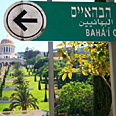
Iran: Bahai leaders detained over ‘connection with Zionists’
Iranian government confirms: Six leaders of Bahai community arrested as a result of anti-Iranian activity and Zionist ties.
Iran confirmed on Tuesday that it arrested leaders of the Bahai community for “anti-Iranian” activities. Last week it was reported that intelligence officials arrested six Bahai community leaders at their homes.
Government Spokesman Gholam Hossein Elham confirmed the matter and said that “this group worked against the state’s interests and had connections with foreigners, especially Zionists.”
Elham also said that “our intelligence service has acted based on legal criteria and it is pursuing the issue as a duty and as part of every country's rules."
Last week, Canadian Foreign Minister Maxime Bernier expressed concern over the arrest and called for their release. The Canadian minister accused Iran of arresting them, "Solely on the basis of their faith," but the Iranian spokesman said that “this (arrest) does not have to do with ideological issues or if you want to call it beliefs, which we basically do not approve of."
One of the estimations is that the Bahai
leaders were arrested as a result of a bombing which occurred last month in a Shiraz mosque that killed 14 people. The bombing occurred while a local clergyman was preaching against the Bahais.
However, Iran officially blamed a local terror organization and arrested more than a dozen suspects, who according to the government admitted that they received funding and instruction from the United States, England, and Israel. However, Iran has not yet shown any proof of this.
In January, Iran announced that it tried 54 Bahais over propaganda against the regime charges. Three of them were sentenced to four years imprisonment and the rest were sentenced to a year’s imprisonment on probation. Justice officials said that the Bahais held missionary activity in Shiraz under the guise of assistance to the needy.
The Bahai religion developed in Iran in the 19th century, but since the 1979 Islamic Revolution is considered illegal in the Islamic Republic. According to estimations, 300,000 Bahais live in Iran. They are considered infidels according to the government and are forced to practice their religion in secrecy.
The Bahais view the Bahaullah, born in 1817, as their last prophet, sent by divine intervention to the world. The Bahaullah was banished from Iran and buried in Haifa, Israel, the most sacred place for the Bahai religion.










